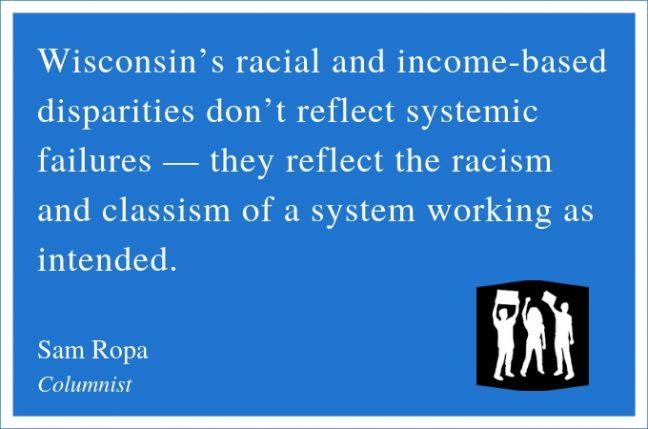Wisconsin has inexcusable racial disparities in its prison system and more prisoners than it knows what to do with. For good reason, Wisconsinites are calling and fighting for prison reform and demanding an end to mass incarceration.
But the problem isn’t mass incarceration — it’s incarceration itself.
Wisconsin doesn’t need to prioritize probationary sentencing over imprisonment or simplify the terms of community supervision, repeal truth-in-sentencing legislation, or settle racial disparities in arrests, plea bargain offers and sentencing outcomes — though these are crucial first steps.
Wisconsin needs to get rid of its prisons.
The fiscal cost of state prisons is unjustifiably high. The Wisconsin Department of Corrections annual budget is around $1.2 billion dollars, which has ballooned since the late 1970s, roughly proportionally to the growth of Wisconsin’s prisons.
Unsurprisingly, Wisconsin bears much higher corrections costs than its neighbors, Minnesota and Iowa, a gap that may reflect real differences in crime rates. But Michael O’Hear, a law professor at Marquette University, noted the cost gap between Wisconsin and its neighbors is much larger than the gap between their crime rates.
Gap in prison, university spending reveals questionable priorities
“Higher corrections spending in Wisconsin cannot be explained solely by reference to the state’s higher crime rate,” O’Hear said.
And the explosion of Wisconsin’s prison system, from 3,400 prisoners in 1976 to more than 23,000 today, took place when Wisconsin’s violent crime rates — like crimes rates across the country — were falling, so a majority of prisoners are non-violent and drug offenders.
Decades of social research show that poor and non-white people are hurt most by prison systems.
In Wisconsin, black people are incarcerated at more than 10 times the rate of white people. Per the 2010 census, 2,639 of every 100,000 Native American or indigenous people in Wisconsin were incarcerated, and the number has only grown. In 2016, Native Americans made up 5 percent of all prison admissions despite representing only 1.1 percent of Wisconsin residents.
Comparing the incomes of incarcerated and non-incarcerated men, researchers found they differed starkly by race. The median income for imprisoned white men was $21,975, and the median income for non-incarcerated white men of the same age was $47,505. The income for black men was $17,625 and $31,245 for incarcerated and non-incarcerated men, respectively.
While education level itself doesn’t indicate socioeconomic status, research has shown its effect on racial differences in incarceration. The risk of incarceration for black men with less than a high school education is almost 70 percent, compared to 28 percent of white men with similar education.
Not only are black Americans and poor people disproportionately imprisoned, some scholars regard prisons as a system for managing these groups. In this view, Wisconsin’s racial and income-based disparities don’t reflect systemic failures — they reflect the racism and classism of a system working as intended.
A report from the People’s Policy Project uses data from a national longitudinal health study to assess two explanations for incarceration disparities. One explanation is that mass incarceration is that it represents the “New Jim Crow,” a racist system for controlling black people, that prisons are part of a system rooted in the subjugation of former slaves. As the renowned legal scholar Michelle Alexander shows in her book, “The New Jim Crow,” more black Americans are imprisoned today than were enslaved before the Civil War — a reality reflected in Wisconsin’s prison system.
The other explanation considers incarceration a way of controlling poor people after the rollback of liberal welfare programs. Increasingly, the report finds, class is the best indicator of whether young men will be jailed or imprisoned, but that race has a significant impact on whether young men will spend more than a year in prison. Poor men are likely to spend some time in jail or prison, but poor black men likely have longer sentences.
By the standards of economic analysis, prisons impose enormous, but well-hidden, social costs. In the Berkeley Journal of Criminal Law, Peter Salib argues that prison is a “deeply inefficient device for serving the utilitarian aims of the criminal law system.” Prisons, in other words, aren’t working as they were intended — they don’t deter crime at the lowest social cost.
UW professor discusses racial disparities in criminal justice system, mass incarceration
The families broken by incarceration, the devastation of Wisconsin’s black, Latinx and indigenous communities, the lost opportunities for earnings and employment, the young people who will be raised without one or both parents, don’t justify what little crime the threat of imprisonment prevents.
What Wisconsin needs is a criminal justice system grounded in certain accountability, not severe punishment.
Prisons satisfy a retributive desire to keep some people safe and punish those considered irredeemably dangerous — they measure “safety in chains and corpses” — but they don’t really keep people safe.
Mariame Kaba, a writer and prison abolitionist, recognizes that because prisons “are inherently violent, then a world without policing, prisons and surveillance means less violence.”
Wisconsin needs to heed her words — and abolish state prisons for good.
Sam Ropa ([email protected]) is a senior majoring in geography and anthropology.




















